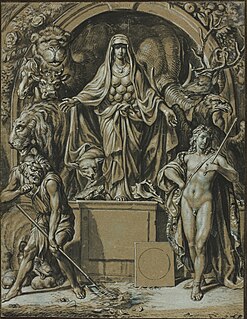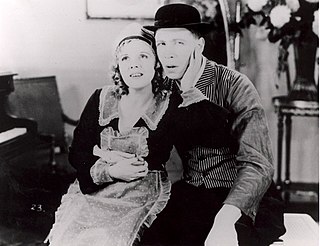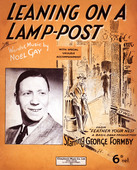Related Research Articles

Formby is a town and civil parish in the Metropolitan Borough of Sefton, Merseyside, England, which had a population of 22,419 at the 2011 Census.

George Formby, was an English actor, singer-songwriter and comedian who became known to a worldwide audience through his films of the 1930s and 1940s. On stage, screen and record he sang light, comical songs, usually playing the ukulele or banjolele, and became the UK's highest-paid entertainer.

A miser is a person who is reluctant to spend, sometimes to the point of forgoing even basic comforts and some necessities, in order to hoard money or other possessions. Although the word is sometimes used loosely to characterise anyone who is mean with their money, if such behaviour is not accompanied by taking delight in what is saved, it is not properly miserly.

Mother Nature is a personification of nature that focuses on the life-giving and nurturing aspects of nature by embodying it, in the form of the mother.

No Limit is a 1935 British musical comedy starring George Formby and Florence Desmond. The film, which was directed by Monty Banks, was made on location at the TT motorcycle race on the Isle of Man. It was the first of eleven films that Formby made with Associated Talking Pictures.

George Formby was an English comedian and singer in musical theatre, known as one of the greatest music hall performers of the early 20th century. His comedy played upon Lancashire stereotypes, and he was popular around Britain. His nickname, "The Wigan Nightingale", was coined because of the way he would use his bronchial cough as a comedic device in his act.

"A Wise Old Owl" is an English language nursery rhyme. It has a Roud Folk Song Index number of 7734 and in The Oxford Dictionary of Nursery Rhymes, 2nd Ed. of 1997, as number 394. The rhyme is an improvement of a traditional nursery rhyme "There was an owl lived in an oak, wisky, wasky, weedle."

"When I'm Cleaning Windows" is a comedy song performed by Lancastrian comic, actor and ukulele player George Formby. It first appeared in the 1936 film Keep Your Seats, Please. The song was credited as written by Formby, Harry Gifford and Fred E. Cliffe. Formby performed the song in A♭ in Keep Your Seats, Please. For the single release, the key was changed to B♭.

Spare a Copper is a 1940 British black-and-white musical comedy war film directed by John Paddy Carstairs and starring George Formby, Dorothy Hyson and Bernard Lee. It was produced by Associated Talking Pictures. It is also known as Call a Cop. The film features the songs, "I'm the Ukulele Man", "On the Beat", "I Wish I Was Back on the Farm" and "I'm Shy". Beryl Reid makes her film debut in an uncredited role, while Ronald Shiner appears similarly uncredited, in the role of the Piano Mover and Tuner.

Get Cracking is a 1943 British comedy war film, directed by Marcel Varnel starring George Formby, with Dinah Sheridan and Ronald Shiner. It was produced by Marcel Varnel and Ben Henry for Columbia (British) Productions, a subsidiary of the American studio. The film opens like a World War Two documentary with a narrator explaining the action, before becoming a more traditional Formby vehicle.

Feather Your Nest is a 1937 British musical comedy film directed by William Beaudine and starring George Formby, Polly Ward and Enid Stamp-Taylor.

Boots! Boots! is a 1934 British comedy film directed by Bert Tracy and starring George Formby, Beryl Formby, and Arthur Kingsley. It was made by Blakeley's Productions, Ltd. at the Albany Studios in London. The premiere of the film was in Burslem, Stoke-on-Trent.

"Leaning on a Lamp-post" is a popular song written by Noel Gay and best known in the version by George Formby.

Adam Barry is the English Hammond organ/piano/accordion/harmonica/backing vocalist for the folk group Merrymouth, led by Barry, Simon Fowler and Dan Sealey from Ocean Colour Scene. Before joining Merrymouth, Barry was a co-founder member of the band The Misers.

The English comic, singer and actor George Formby performed in many mediums of light entertainment, including film, radio and theatre. His career spanned from 1915 until December 1960. During that time he became synonymous with playing "a shy, innocent, gauche, accident-prone Lancashire lad".

Off the Dole is a 1935 British film starring George Formby. Formby appeared as John Willie, a stage character originally developed by his father, George Formby, Sr.; Beryl Formby, Formby Jnr's wife, also appeared in the film.
"Delivering the Morning Milk" is a comic song written by George Formby, Harry Gifford and Frederick E. Cliffe. Formby recorded it on 28 July 1941 for Regal Zonophone Records. The song is similar to Formby's signature tune, "The Window Cleaner", only now he now describes the various sights he sees, often of a sexual nature, while out on his milk round.
"On the Wigan Boat Express" is a comic song written by George Formby, Harry Gifford and Frederick E. Cliffe. Formby recorded it on 4 August 1940 for Regal Zonophone Records. It tells the story of, and goings-on aboard, a boat train express heading for Formby's hometown of Wigan in Lancashire. Like several other of Formby's songs, and indeed comic routines by his father George Formby Snr, it maintains and develops the running joke that Wigan is a seaside town rather than an inland, industrial centre, and like Blackpool, has a “pier” albeit on a canal. It is filled with the sort of sexual innuendo that was a hallmark of Formby's songs.

"The Emperor of Lancashire" is a 1941 comic song written by Roger MacDougall for the British comedian George Formby. In it Formby boastfully proclaims about his future success that will one day make him Emperor of the English county of Lancashire. It is filled with a number of references to Lancashire dialect and culture.

"With My Little Stick of Blackpool Rock" is a popular song by English entertainer George Formby, who recorded it in 1937. It was written by his regular songwriting team of Harry Gifford and Fred E. Cliffe, with input from Formby himself.
References
- ↑ Richards p. 194